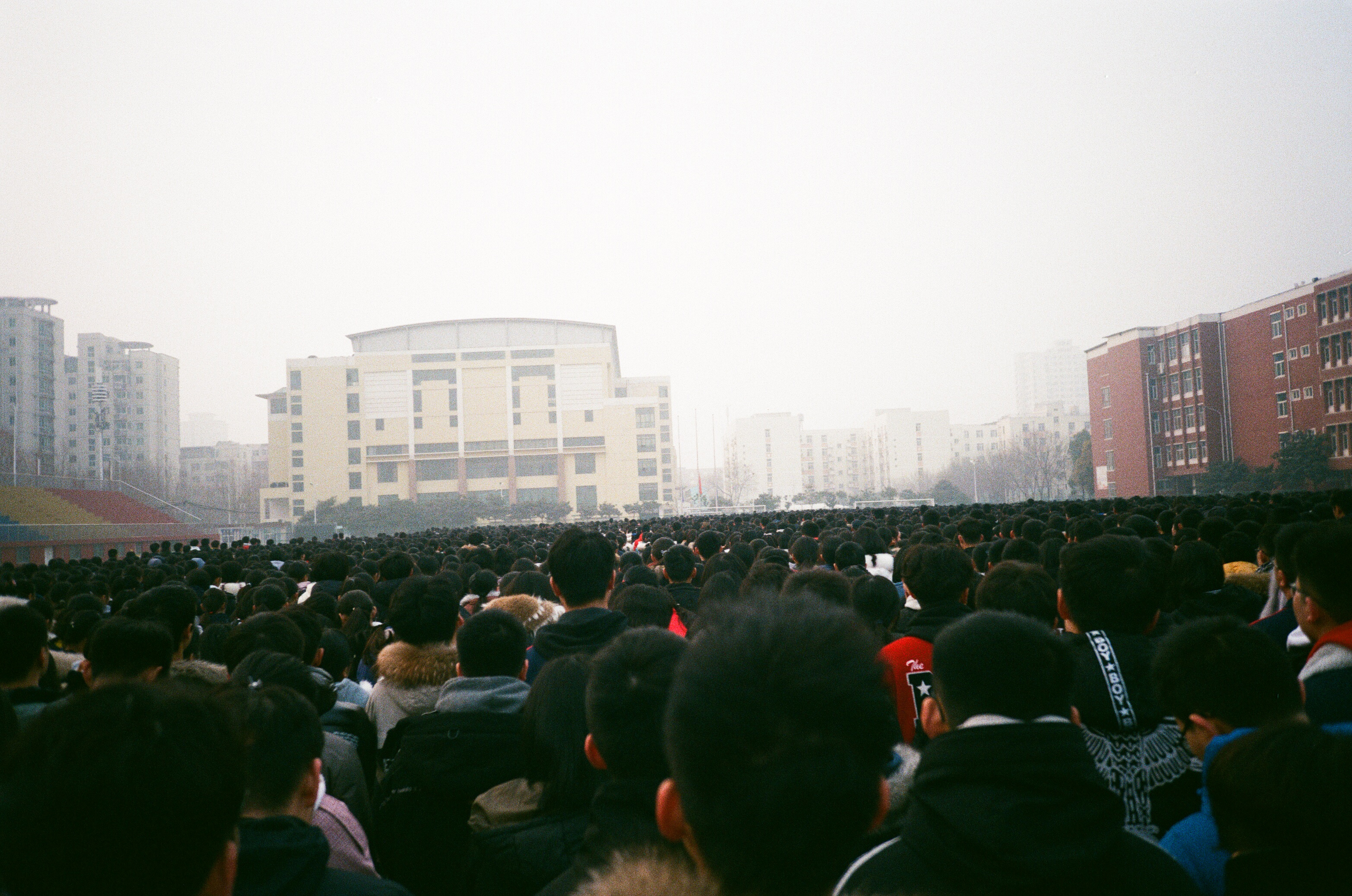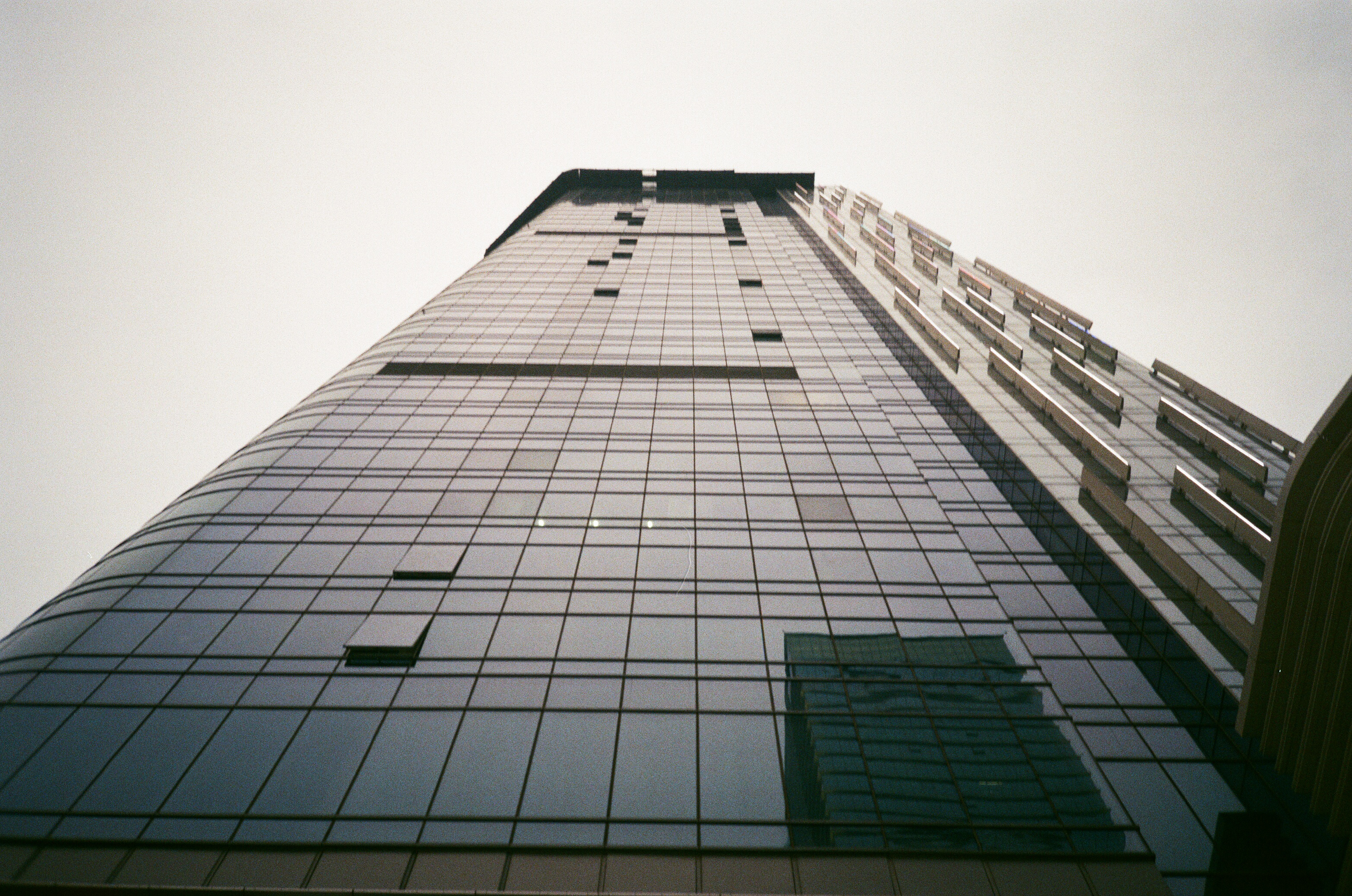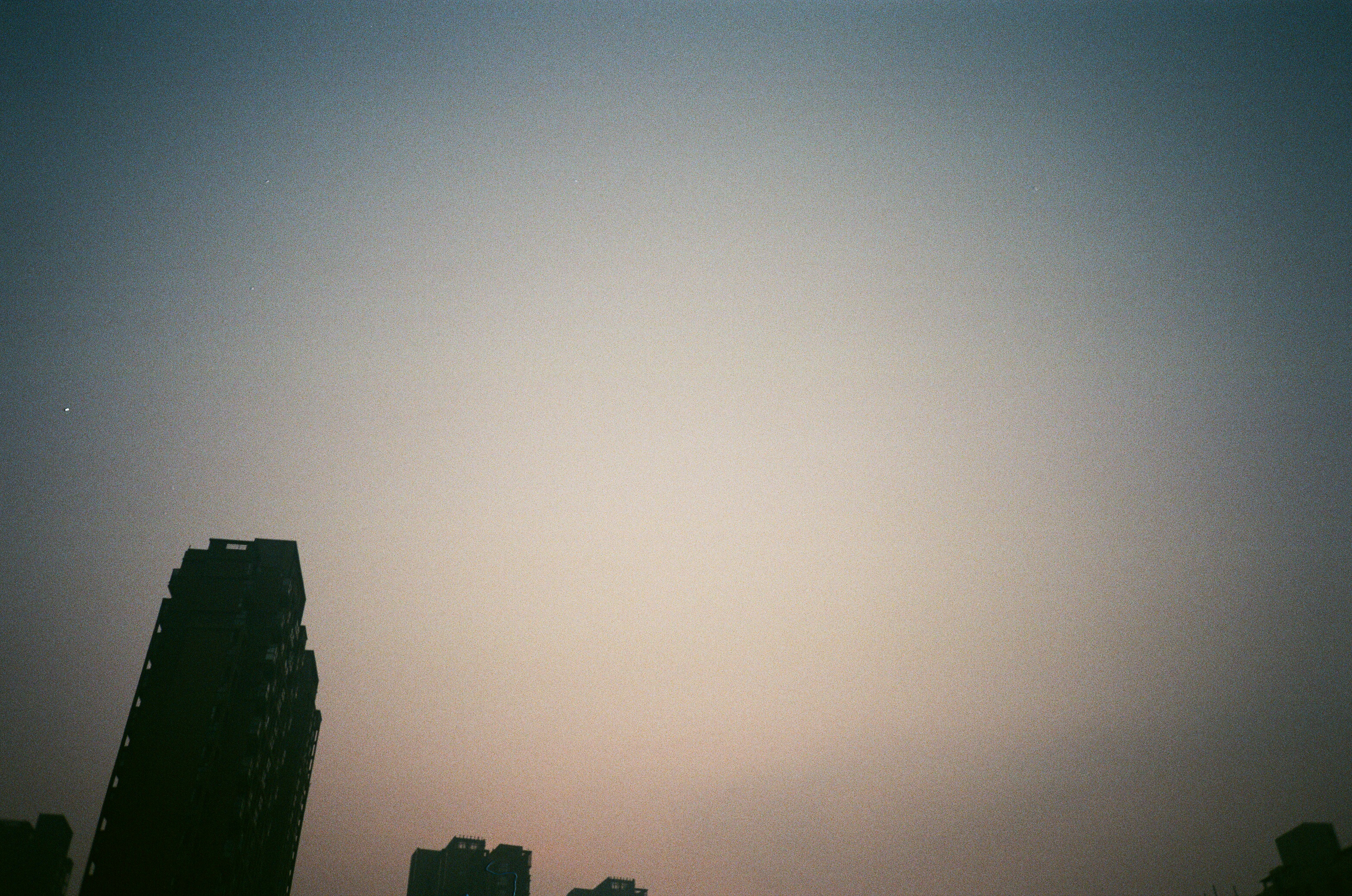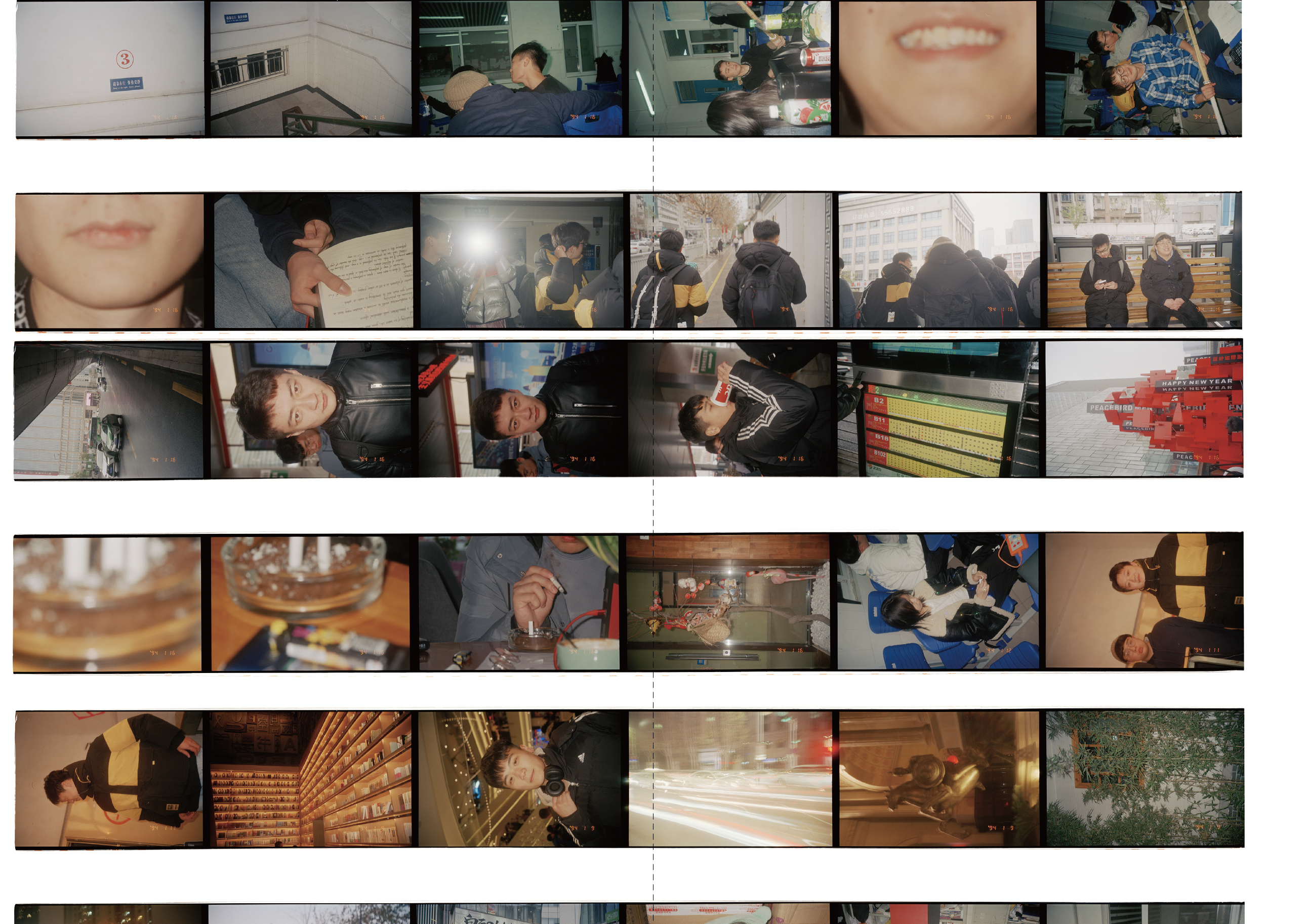High School Years: A Memoir of Henan Experimental High School
点击这里查看公众号文章:少年高中:河南省实验中学回忆录

I still find myself thinking about those days from time to time — whether in dreams or here and now.
I carry many memories from high school, but they’re complex. That period shaped who I am, and it was also when I first began taking photographs. The feeling is a bit like Stockholm syndrome — the memories are laced with both the bitterness of that time and a certain kind of youthful joy.
It’s hard to describe exactly what this feeling is. But in dreams, I often return to those familiar places: the classroom, the hallways, the schoolyard, the golden hour sunlight pouring through the windows. These images intertwine with the anxieties of my present reality, pulling me back into fragments of the past.
Henan Experimental High School — I spent the most defining years of my student life there. From middle school through high school, those six years marked a vivid chapter. I witnessed the school at its most glorious and open during the era when it was ranked among the best in the city, and I also saw it gradually shift into something it once vowed not to become — a machine driven solely by college admission rates.
Back then, there was a kind of myth about our school — that it was one of the few “Triple-A” schools in my hometown Zhengzhou that valued both academics and extracurriculars. No one asked you to wear the uniform everyday, as long as you could perform well. Because of that, the students who came out of it weren’t your typical “nerds.” They were usually strong in both studies and social interaction. In today’s terms, they had what you might call a real sense of aliveness.
 The school was undeniably large. Every opening ceremony, when both middle and high school students gathered for the flag-raising, the entire field would be completely packed.
The school was undeniably large. Every opening ceremony, when both middle and high school students gathered for the flag-raising, the entire field would be completely packed.
At 6 p.m., the hallways would be bathed in golden light as students poured out of classrooms — not exactly the end of the day, but rather a brief window to grab dinner before returning to our seats for the evening self-study session, which began as the sky turned dark. Looking back, that brief moment — walking through the sunset-lit corridors between classes and dinner — might have been the closest I came to truly feeling the presence of life in the midst of an otherwise tightly scheduled school day.
I’ve always felt incredibly lucky—at such a formative stage in life, I was placed into a school that truly emphasized “holistic education.” In retrospect, it was nothing short of remarkable. My graduated high school might have been the most active school in Zhengzhou when it came to student clubs and extracurricular life.
Every year during the sports festival, each student club would set up a booth circling the basketball court, like a mini version of a Japanese high school culture festival. It was part exhibition—showcasing the past year’s activities—and part recruitment drive. I still remember, back in junior high, I would often see the older students from the high school division spending their free time on hobbies that had nothing to do with academics. I used to look up to them and imagine myself living that kind of high school life one day.


At the beginning of each semester, there was also a designated time when every student club would give a presentation in the school’s media hall to introduce their group.
I was placed in one of the rare “small classes” in my grade—around 30 students in total. At first, we were sorted by our high school entrance exam scores, but looking back, it really felt like a stroke of luck. Most of my classmates were what you’d call high-achieving misfits—brilliant in academics but each with their own quirks. A few of them were notorious for being rebellious, often leading the charge when it came to pushing back against our homeroom teacher. The dynamic between us and our teacher wasn’t outright antagonistic, but more like a game of Taichi—soft resistance, constant negotiation, and a rhythm of give and take.
Our teacher was, in hindsight, someone with a quiet kind of wisdom—a fact I only began to appreciate years after graduating. Even though we often clashed over trivial things during high school, he never handed down any harsh punishments. One day, after watching the film Detachment, I found myself thinking of him. It was then that I realized the background image on his WeChat Moments was a screenshot of the film’s final monologue—where the teacher stares into the camera and reflects.
But later, I slowly realized that I had underestimated the pressure of high school — and overestimated my own ability to manage time. The harder I tried to balance studying and the things I loved, the more I discovered that I couldn’t. For about a year and a half, I pushed myself to hold everything together. Then, one winter morning in 2018, it all suddenly collapsed.
That morning, I was supposed to wake up early and attend a full day of cram-school classes. But when I arrived at the building, I froze. I still don’t know why. My body simply turned around and carried me onto the subway. I first went to the park I used to love as a child, and then somehow ended up at my grandfather’s house, where I broke down in tears.
My mind seems to have erased most of the painful memories from that time, as if it’s protecting me. What I do remember is the question that kept echoing in my head: What do I really want to do with my life? At that age, the question felt unbearably important. I didn’t want a life where everything was already laid out, predictable from beginning to end. I used to stand by the window on the fifth floor after class, looking down at the streets below, thinking about it over and over. And it was in that moment — right at my breaking point — that an unexpected turning point arrived.


Later, when I started taking more photos again, I found myself back in front of that cram school building. That was pretty much how each day felt during that time — grey mornings, freezing cold. Every morning, I’d head out with that winter smell of burning straw in the air. And by the time I got home, it was already dark.
It was my birthday that year when my best friend in high school gave me a disposable film camera. She was an art student. Looking back, I think maybe it was her intuition — or perhaps fate had something planned all along. I only remember her telling me, “Why don’t you take this camera and go document something you’re interested in? Who knows, maybe it’ll inspire you.”
I never expected that from that moment on, I would keep taking photos until graduation, and through that lens, I captured one of the most precious times I shared with my classmates.
The photos from my first disposable film camera. I remember not knowing what to photograph when I first got the camera — I simply followed my intuition. A dismantled blackboard left in the hallway, classmates chatting during breaks, a group of guys sneaking cigarettes in the bathroom, and myself, from back then.
Back then, I was always running around the grade with my camera. The excitement and joy of just starting to shoot made me wander from classroom to classroom —
I basically photographed whatever caught my eye. Looking back now, that impulsiveness and intuition feel incredibly precious.
Looking back now, it’s hard for me to describe exactly what kind of emotions or feelings I had at the time. It all just felt very natural — your best friend gave you a point-and-shoot film camera, you were surrounded by people you knew well, and then you found taking pictures to be a lot of fun. Over time, the camera gradually became an outlet for all those little, unspoken emotions in my life back then.
Strangely enough, when I think about the process of taking photos during that time, what’s amazing is that neither my classmates nor my teachers resisted — in fact, many were very cooperative. Sometimes I felt like I was invisible in the classroom, quietly recording whatever was happening. Maybe it’s just like I mentioned earlier — the advantage of being in a small class was that everyone had closer relationships. In a high-pressure high school environment, classmates naturally became the most important companions in everyday life.
Back in Grade 11, to save trouble, everyone in our class collectively bought a batch of air mattresses and kept using them in the classroom all the way until just before graduation. During lunch breaks, we would lie down in the open space at the back of the room, all slumped over in different directions. Thinking back now, I can only remember how, by the end, those mattresses felt pretty much the same as sleeping directly on the floor — all the air inside had been squeezed out.
At the time, I didn’t realize that these photos would one day become something so precious — not just to me, but also to my classmates. It was around then that, because of the feelings behind these photos, I decided to study photography in university. So aside from working on photos for my portfolio, I spent my free time taking pictures of everyday moments in our class. I was shooting maybe two or three rolls a month back then (film was still quite cheap at the time — now it feels like a luxury). Every time I got them developed, I’d share them in the class group chat. If a photo looked nice, people would ask for it and post it on their social medias; if it didn’t, it would usually get turned into a meme.
Back then, I wouldn’t ask my classmates to pose or do anything specific — most of the time, I would just suddenly raise the camera in front of them, and capture whatever natural reaction they had in that moment.
 “Uncle” was the classmate in charge of managing our class funds and other little things. We called him “Uncle” partly because his personality really did feel like that of a reliable older relative — he’d occasionally bring fruit for everyone in class. On the other hand, he did look a bit mature for his age back then. Years after graduation, when I saw him again, he still looked exactly the same as he did back then…
“Uncle” was the classmate in charge of managing our class funds and other little things. We called him “Uncle” partly because his personality really did feel like that of a reliable older relative — he’d occasionally bring fruit for everyone in class. On the other hand, he did look a bit mature for his age back then. Years after graduation, when I saw him again, he still looked exactly the same as he did back then…And just like that, I kept photographing from Grade 11 all the way through Grade 12 — from everyday moments on campus and PE exams, to times when we’d go out to eat together at restaurants. During this period, as I grew in my photography practice, I also started to explore perspectives I hadn’t thought of before.




 As I kept shooting, I gradually started wanting to present these photos as a cohesive project — and this became my favorite period. Compared to the earlier, more impulsive stages, I began to approach things with more observation and reflection. From inside the school to the world outside, I slowly became more aware of the absurd yet interesting moments in our daily lives as classmates. And little by little, I started to realize that maybe these photos were turning into something — a kind of precious memory.
As I kept shooting, I gradually started wanting to present these photos as a cohesive project — and this became my favorite period. Compared to the earlier, more impulsive stages, I began to approach things with more observation and reflection. From inside the school to the world outside, I slowly became more aware of the absurd yet interesting moments in our daily lives as classmates. And little by little, I started to realize that maybe these photos were turning into something — a kind of precious memory.

 Other than that, what I shot the most were close-up portraits. Looking at them now, the technique was still quite rough, but there’s always this indescribable feeling from that time that lingers in them.
Other than that, what I shot the most were close-up portraits. Looking at them now, the technique was still quite rough, but there’s always this indescribable feeling from that time that lingers in them.I remember the Spring Festival in 2020 was in January — it was our last winter break before graduating from high school. On the day before the holiday started, some classmates arranged to go out for barbecue. It was lightly snowing in Zhengzhou that day. The boys chose to eat at a place that was trending at the time for its “egg and kidney skewers,” while the girls went to an old barbecue restaurant near the provincial stadium that had been open for over 30 years. That day, as usual, I brought my camera with me, documenting everything that was happening around me and my classmates, even though I had just recovered from the flu. To me, it just felt like another ordinary day — soon the break would be over, we’d return to school, and spend our final stretch of time in high school. And I thought my documentation would neatly carry through to the moment we graduated.
But life is unpredictable. The pandemic disrupted all the plans and thoughts I had. Everything about life on campus and in our classroom came to a sudden stop in early 2020. From then until graduation, we never returned to school — we finished everything online. Although after restrictions eased we still met up often in person, it never quite felt the same again.



When I look back at these photos, I often find myself wondering — why are we always so nostalgic for the time before the pandemic? As if everything before COVID was filled with vitality and hope, even the colors of film seemed to carry a different feeling. I still can’t tell whether it’s because the material itself has changed, or if it’s something else entirely.
Time flies — it’s been nearly eight years since all of this happened. Revisiting these moments and images still stirs up a lot of emotions. Sometimes I laugh at small details in the photos that I never noticed before. Sometimes I realize that the couples captured in those school days have since made it through the years and gotten married.
After graduation, I’ve only seen a few of the people in those photos again. Everyone has gone their separate ways, scattered across different cities, even different time zones. While we still occasionally keep in touch, deep down we all know — we’re already walking our own paths in life. Sometimes I find myself wondering: why do I keep dreaming about high school? Why this lingering nostalgia? Maybe it’s because I miss the version of myself who didn’t yet understand the world.
In the end, I just want to thank all the classmates and teachers I met during those years. I wish you all the best in whatever comes next. Until we meet again — if fate allows.


Words on the Image:
Words at the End
For me, maybe the meaning of a photograph lies in how it carries memory — the feelings and sensations from the moment it was taken. If I really had to assign it some grand significance, it would probably feel a bit hollow. After all, a photo is just what it is. It can’t become anything else.
I don’t know what the future will look like. And to be honest, the past six months have only made me feel more uncertain about what lies ahead. Even now, for those classmates who rarely post on social media, I honestly have no idea what you’re up to. I guess I’m just genuinely curious about how you’re doing.
If you’re doing well — I hope you continue to stay that way.
If things aren’t going so smoothly — then hang in there. I believe there will be a way forward, eventually.
I think that’s all I really wanted to say.
Wishing everyone all the best.
That’s it.
Yufei Ma
Genki
Written on August 24, 2020
